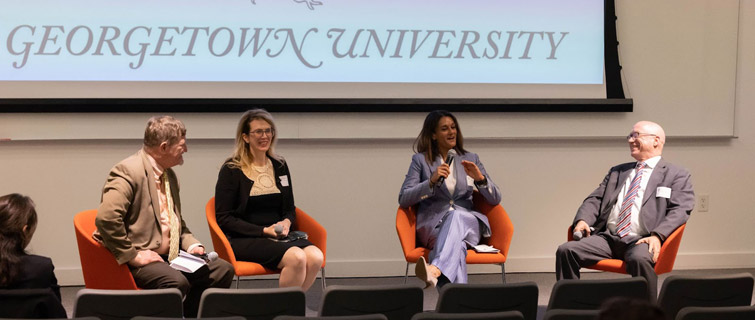
WASHINGTON, D.C. — From domestic terrorism to machine learning, panelists from member universities in the Intelligence Studies Consortium (ISC) gathered at the School of Continuing Studies (SCS) in early April to address current and emerging security challenges in the U.S. intelligence community.
The Intelligence and the Changing Security Environment symposium included speakers from Georgetown University, George Mason University, James Madison University, Johns Hopkins University, National Intelligence University and more. Panelists from the nine universities discussed the rapidly changing intelligence field, in efforts to advance the industry and contribute to the common good. The event was also co-sponsored by Johns Hopkins University, the International Association for Intelligence Education, and UNUM: the National Security Innovation Network.
Speakers from the universities led collaborative panel discussions, sharing new insights on a wide variety of topics ranging from ISIS, domestic terrorism, and the impacts of climate change.
Annie Glassie, a student in the Master’s in Applied Intelligence (AI) program, proposed using crowdsource applications to generate maritime intelligence. The goal of the app, called “Sea Watch,” is to monitor maritime traffic specifically in the South China Sea to identify ships operating in that area.
A Testament to the Growth of SCS’s Applied Intelligence Program
Dr. Kelly Otter, the dean of SCS, said a vital part of SCS’s mission is to educate students to be global citizens across a wide range of industries. Otter said this symposium shows how much the AI program has grown over the years.
“The fact that the ISC Symposium is being held here today speaks not only to the strength of our student-practitioner model, but also to the emerging leadership of our own Master’s in Applied Intelligence program,” she said.
Otter said the growth is in large part thanks to Dr. Frederic Lemieux, the Faculty Director and Professor of the Practice for Applied Intelligence Program. He has led the program through tremendous growth since its founding only in 2018. As of January, SCS had nearly 500 students enrolled and 40 faculty members.
During the event, Lemieux shared his insights with the forum – one being that AI students are the future leaders of the intelligence community. He said he believes the ISC symposium clearly displayed the breadth and depth of emerging security challenges in the current environment.
“It also showed how the current and future intelligence professionals envision creative solutions to tackle these challenges,” Lemieux said.
The Cutting Edge of Intelligence Studies
Experts and students at the symposium discussed cutting edge topics from data analysis to morals and ethics in intelligence.
Keynote speaker and fellow Georgetown graduate, Joseph Gartin offered valuable insight during these discussions, referencing his 30 years of experience in the U.S. intelligence community. He is a national security professional and currently managing editor of Studies in Intelligence.
Gartin said that the symposium demonstrates how much the program has expanded since he graduated from Georgetown and began his career. He encouraged the audience to use the information they learned from the forum to collaboratively rethink the future of intelligence analysis.
“This, to me, is the opportunity to find ways to incorporate technologies that all of us are relying on into the intelligence community, into intelligence analysis in particular, to find better ways to do analysis,” said Gartin.
Experts and learners from SCS and beyond, showcased how the AI program and its related events such as the ISC symposium play an important role in building crucial connections.
Dean Otter noted that students in AI represent the cutting edge of the industry as they work together to create innovative solutions for the intelligence community’s emerging challenges.
“Our society faces multiple, interlocked global crises, but no matter how different they are, ultimately they cannot be tackled alone,” said Otter.
